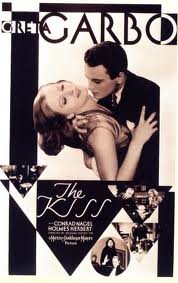Welcome to another Film Friday! Today, we’re continuing our coverage of films released in 1929! In the title, I refer to 1929 as a year of firsts and lasts. I’m primarily speaking of the transition to sound, which went into full swing by 1929, and had every major studio technologically converted to the process — most notably M-G-M. Stars we’ve covered here like Norma Shearer and Joan Craford made their sound debuts. But the year wasn’t completely all-talking just yet — 1929 also saw the slow burning off of the silent films, which essentially ceased production by the time the year was over. The few films I’ll be featuring here (both talkies and silents) show an industry on the cusp of the biggest turning point in cinema history. So how do the films of 1929 stack up? I’m just as curious as you are to find out! So far we’ve looked at Pandora’s Box, Their Own Desire, Applause and Blackmail! Next up… The Kiss!
The Kiss (1929)
A woman’s generosity to an amorous youth leads to tragedy. Starring Greta Garbo, Conrad Nagel, Anders Randolf, Holmes Herbert, and Lew Ayres. From the story by George M. Saville. Scenario by Hans Kraly. Directed by Jacques Feyder.
In addition to being both MGM and the divine Garbo’s final silent film, The Kiss, running at just over an hour, is one of those later silents from which audiences sort of expect a trite and predictable story. That is, the emphasis is on the stars and the look of the film, rather than the content. Now, you readers know I am a “content” man, however, as cinema — particularly in regard to silents — is a visual medium, there are times when we must ignore story shortcomings and appreciate the illumination of the moving pictures. Of course, it helps when there are stars like Garbo, eliminating doubts and nitpicks and redirecting all thoughts to her radiance. But, all films have a story. In this one, Garbo plays Irene…
“Irene, victim of a loveless marriage to wealthy Guarry, carries on a clandestine affair with André, a young lawyer whom she loves but forces herself to forget; and in desperation, he leaves and goes to Paris. Pierre, the youthful son of a Lyon financier, is fascinated by Irene, and when she gives him an innocent goodby kiss, Guarry, thinking she has been unfaithful to him, attacks the boy. The ensuing struggle results in Guarry’s death. Irene recounts the events of the fateful evening to the police, but her story is full of contradictions and she keeps the boy’s name out of the affair. Brought to trial, she is acquitted with André’s help, but later she confesses that she killed her husband to save the boy’s life. At last she finds happiness with André.” (This summary is brought to you courtesy of TCM.)
I can sum the plot up quicker: Unhappily married Garbo kisses an admirer, angering her husband. So she kills her better half, gets acquitted, and runs off with the lover she’s yearned for the entire picture. It’s nothing novel — and the direction doesn’t really do anything to elevate the blandness of the premise. Rather, save a few moments near the end, there’s little distinctiveness about Mr. Feyder’s directing. Normally, since my roots stem from the theatre, I prefer pictures in which the director’s principal focus is telling the story, rather than self-importantly infringing upon the film with an excess of “personal style.” (That seems to be the trend in films of today, mind you. My opinion may be in the minority.) But with the story being so weak, the picture — relying solely on images rather than words — needs to look extraordinary. Unfortunately, though some sequences appear quite attractively (and I must insist that several moments are excruciatingly gorgeous), the film collectively seems ordinary, especially during the middle chunk of the film in which most of the action occurs. However, The Kiss is a mercifully short film, which means that everything is fast-paced and plays with an underlying focus and intensity. This works quite well for the film, as the tension seems to enhance the drama without making it seem any more melodramatic than the story already necessitates.
Naturally, the principal reason that anyone would watch this film is Garbo. She’s outstanding. Garbo is beautiful, passionate, mysterious — and she hits all the right notes in her performance. I’ve featured clips from some of my favorite Garbo silents in one of my earliest Film Friday posts, but there are SEVERAL sequences in this film — largely framed solely around her look and her performance — that could rival those clips in aesthetic majesty. Perhaps in this arena, the direction does emerge victorious; while it doesn’t sell its story, it certainly sells its star. So, fellow film fans, seek out The Kiss if you adore Garbo. Otherwise, save this one for when it plays on TCM — and watch with, as I say a lot here, adjusted expectations.
Come back next Friday for another 1929 film! And tune in on Monday for the start of a whole new week on That’s Entertainment!





